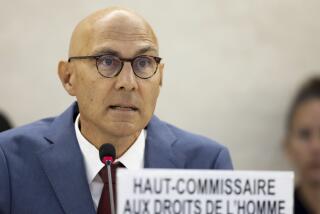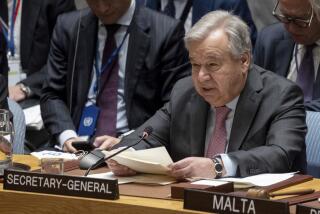U.N. Elects 47 Countries to Human Rights Council
- Share via
UNITED NATIONS — U.N. members elected 47 countries to a new Human Rights Council on Tuesday, choosing several that have been criticized for their poor records but keeping off others that rights groups said were the worst offenders.
Cuba, China, Russia, Pakistan, Azerbaijan and Saudi Arabia were among countries winning seats that human rights advocates say do not merit places on the council.
But Iran and Venezuela, which were identified by rights groups as having dismal rights records, were not chosen for the council, and the new body’s higher standards kept the worst violators from running at all.
“The big improvement happened before voting even started,” said Kenneth Roth, executive director of New York-based Human Rights Watch, which analyzed every candidate’s rights record. “The new architecture made it so that the truly bad guys didn’t dare to run. This time, countries like Sudan, Libya and Zimbabwe were not vying to undermine the new council.”
The United States decided not to run for a seat after voting against the creation of the council because Washington believed the body needed stronger safeguards to keep human rights abusers from gaining seats.
Critics have suggested that the U.S. might not have won a seat in a year when it is under investigation by the U.N. body for its treatment of prisoners at Abu Ghraib in Iraq and Guantanamo Bay, Cuba. But Washington has pledged to support the new council, and to work from the outside to help shape it in its crucial first year.
“It’s about the result we expected even though a number of countries that are themselves gross abusers of human rights got elected,” said U.S. Ambassador John R. Bolton.
He told reporters that Washington had not decided whether to seek a seat in the next election.
“The performance of the Human Rights Council over the next two or three years will be critical,” he said.
The new council replaces the much-criticized Human Rights Commission, which had become a symbol of U.N. dysfunction after human rights violators such as Sudan and Zimbabwe were able to gain seats on the body and use their positions to block censure of their policies.
Candidates for the new council were required to pledge to uphold human rights standards, and the newly elected members will undergo a review of their performance in upholding freedoms.
“This is an innovation, and it is important that we have established this principle, that all members of the council are to have their human rights record reviewed,” said the president of the General Assembly, Jan Eliasson of Sweden.
Elected to the council were 13 African nations, 13 Asian states, six from Eastern Europe, eight from Latin America and the Caribbean and seven from the United Nations’ “Western Europe and other states” regional bloc, which includes the United States.
The council will hold its first meeting June 19.
“The real test for all new members will be whether they live up to the promise to uphold standards for human rights and create a better Human Rights Council,” said Yvonne Terlingen, the U.N. representative of Amnesty International.
More to Read
Sign up for Essential California
The most important California stories and recommendations in your inbox every morning.
You may occasionally receive promotional content from the Los Angeles Times.













